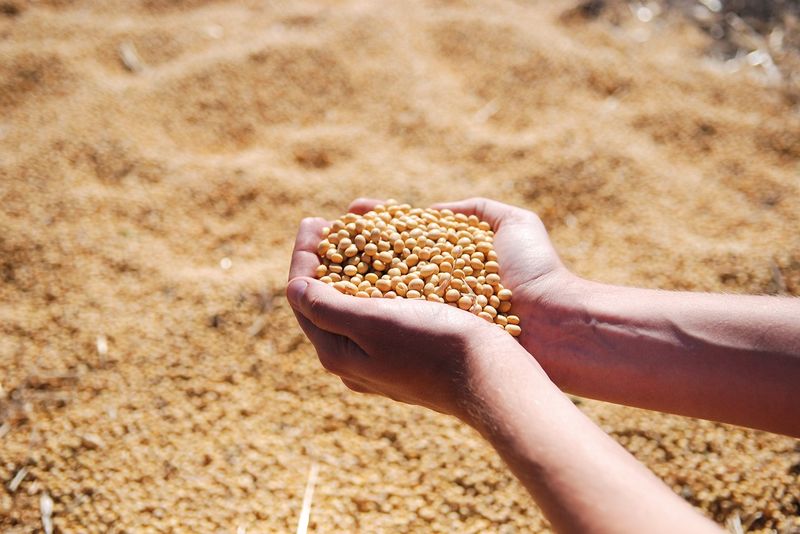Does Soybeans Cause Cancer?

In 2005, The Whole Soy Story was published. This book argues that the consumption of soy is linked to malnutrition, digestive problems, and even heart disease and cancer. More specifically, this author argued that some of the isoflavonoiders available in soy is toxic to estrogen sensitive tissue and as estrogen is closely linked to breast cancer, why the author states that there is a potential risk with eating soybeans. A Swedish site called Greatlife.se then took this even further and argued that soy is not to recommend as food at all, and should be avoided entirely (Greatlife). Almost 3 000 people have liked this article.
This is very interesting as an American study from 2012 actually argue that one of the soybean isoflavones actually prevent and inhibit breast cancer (Li & Tollefsbol, 2012). Another interesting fact about this book is that the author of the book was at the time a member of the board of Weston A. Price Foundation (Dr Kaayla Daniel). This foundation is first and foremost advocating the agenda that people have to eat “fat-soluble activators found exclusively in animal fats” (Weston A. Price). This point of view is based on Weston A. Price research, which has been rejected by many others as unscientific (Sciencebasedmedicine.org)
Without going deeper into the subject, we can at least conclude that one should treat the findings in The Whole Soy Story with some reasonable doubt. Further, the Swedish association Läkare för framtiden (doctors for the future) concludes that “normal soy consumption is completely safe and most likely decrease the risk of breast cancer and decrease the risk of recurrence of cancer” (Läkare för framtiden). This organization on the other hand advocate a plant based lifestyle, why we cannot be sure they’re entirely objective. First and foremost one should trust scientific articles based on solid research, and not statements by individual associations. And at least the scientific articles I’ve been able to find say that normal soy consumption prevents rather than cause cancer.
//År 2005 publicerades boken The Whole Soy Story. Den här boken argumenterar för att konsumtionen av soja skulle vara direkt länkat till näringsbrist, matsmältningsproblem och till och med hjärtsjukdomar och cancer. Mer specifikt hävdar författarenatt de isoflavonider som finns i soja är giftiga för östrogenkänslig vävnad och eftersom östrogen är nära länkat till bröstcancer menar författaren att det finns en potentiell risk med att äta sojabönor. Den svenska sidan Greatlife.se tog det här steget längre och hävdar att soja inte är rekommenderat som livsmedel överhuvudtaget och bör undvikas helt (Greatlife). Nästan 3 000 personer har gillat den här artikeln.
Det här är väldigt intressant med tanke på att amerikansk studie från 2012 istället menar att en av sojabönans isoflavoner faktiskt förhindrar och hämnar bröstcancer (Li & Tollefsbol, 2012). Ett annat intressant faktum är att författaren till den här boken vid publiceringen satt i styrelsen för Weston A. Price Foundation (De Kaayla Daniel). Den här stiftelsen förespråkar att människor måste äta ”fettlösliga aktivatorer som enbart finns i animaliska fetter” (Weston A. Price). Den här åsikten är baserad på Weston A. Prices forskning, vilken har förkastas av många andra som ovetenskaplig (Sciencebasedmedicine.org).
Utan att fördjupa oss mer i ämnet så kan vi konstatera att vi bör behandla The Whole Soy Storys slutsatser med rimligt tvivel. Vidare menar den svenska organisationen Läkare för framtiden att ”normal soja konsumtion är helt säker och minskar troligen risken för bröstcancer och återfall av bröstcancer” (Läkare för framtiden). Den här organisationen argumenterar å andra sidan för en vegansk/vegetarisk livsstil varför det inte är helt säkert att heller de är helt objektiva i frågan. Först och främst bör man lita på vetenskapliga artiklar baserade på gedigen forskning snarare än uttalanden av individuella associationer. Och åtminstone de vetenskapliga artiklar som jag har kunnat hitta menar att normal sojakonsumtion förhindrar snarare än orsakar cancer.
References:
Greatlife.se. Last accessed: 2017-04-06
http://www.greatlife.se/artiklar-och-fakta/soja-inte-att-rekommendera/
Dr Kaayla Daniel. Last accessed: 2017-04-06
http://drkaayladaniel.com/about/bio/
Li & Tollefsbol, 2012 “Enhanced chemosensitivity of estrogen receptor-α (ERα)-negative breast cancer through soybean genistein-induced epigenetic reactivation of ERα”
Läkare för framtiden. Last accessed: 2017-04-06
http://www.lakareforframtiden.se/kost-och-halsa/livsmedel/soja/
Sciencebaedmedicine.org. Last accessed: 2017-04-06
https://sciencebasedmedicine.org/sbm-weston-prices-appalling-legacy/
Weston A. Price Foundation, Mission Statement. Last accessed: 2017-04-06
https://www.westonaprice.org/about-us/about-the-foundation/
